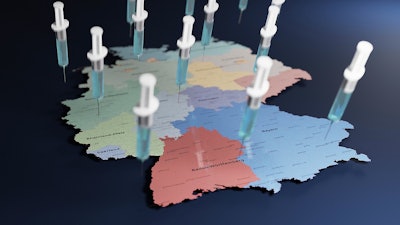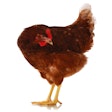
Following an earlier decision to allow the use of vaccines to control highly pathogenic avian influenza (HPAI) in the European Union under certain conditions, veterinary authorities in Germany are reported to be planning to put this measure into practice.
Already in mid-2023, the Standing Vaccination Commission for Veterinary Medicine (StIko-Vet) explored the possibility of vaccination to bring the spread of the disease under control. The group comes under the umbrella of Germany’s national veterinary reference laboratory, Friedrich-Loeffler Institute.
This assessment by Germany followed what StIko-Vet described as a paradigm shift by the European Commission (EC). Previously the EC had ruled against HPAI vaccination of poultry because of the disruption to European Union (EU) exports of poultry products that would likely follow as key destinations imposed a ban on the trade. However, the EC recognized that the evolving nature of the disease required a different approach. This led to the reversal of its earlier position, allowing the competent authority in European Union (EU) member states to authorize vaccination of poultry against the virus. One condition is that strict monitoring measures must be applied.
Supporting the EC’s decision were the fact that HPAI viruses now circulate continuously in wild birds — as well as increasingly in domestic poultry. Furthermore, previous policies of strict biosecurity and stamping-out were no longer effective, and have led to the unacceptable mortality of wild birds, as well as millions of poultry in recent years.
There is still no vaccine against HPAI viruses currently circulating in Europe that has undergone regular authorization, according to STIko-Vet. However, trials in the Netherlands last year revealed that two recombinant HVT-H5 vaccines were effective in eliminating mortality of vaccinated birds, and also preventing cloacal virus shedding.
As a result of this work, Germany has formed a working group of the federal states to make preparations for the use of vaccines, which are expected to be granted regular approval soon.
STIko-Vet states that the HVT vaccines cannot be used in waterfowl. As ducks have been the species in France most susceptible to HPAI in recent years, the French authority separately tested two vaccines in this species. As a result of this work, a program of mandatory vaccination in commercial ducks commenced in France in October. More than 12 million of that nation’s ducks have so far been vaccinated.
Support for poultry farmers in Italy, Czech Republic
Last week, the Directorate-General for agriculture announced that the EC will provide EUR46.7 million (US$50.9 million) to compensate farmers in Italy hit by HPAI outbreaks.
Following agreement by EU member states, the sum will be financed by the agricultural reserve, and it must be passed on the farmers by the end of September this year.
Italy had sought funding after a series of 23 HPAI outbreaks hit the country’s poultry sector within the first four months of 2022. The EU will fund 50% of the compensation for the resulting losses.
Meanwhile, under state aid rules, the EC has approved a budget for two schemes in the Czech Republic (Czechia) to support disease control by poultry and pig farmers.
At a total budget of EUR1.46 billion, the funding aims to support the nation’s poultry farmers to prevent the spread of a number of diseases including HPAI through disinfection and other biosecurity measures. The scheme is open to farms of all sizes until the end of 2029.
HPAI reported on farms in 9 European nations
So far in 2024, the veterinary agencies of nine European states have officially registered HPAI outbreaks in poultry. This is according to the latest update of the Animal Disease Information System by the European Commission (as of January 19). It covers the animal disease situation in European Union (EU) member states and neighboring countries.
Of the total of 44 outbreaks registered, 20 were in Moldova, six in Hungary, and four each in France, Germany, and Poland. Cases have also been detected on farms in Belgium, Bulgaria, Slovakia and Sweden.
Further detail on these outbreaks are provided in official notifications from the national animal health agencies to the World Organisation for Animal Health (WOAH).
Over the past week, the French authority has confirmed four outbreaks of the year so far with WOAH. Starting in the period January 2-15, these involved around 54,000 poultry in total, in flocks each comprising between 6,400 and 21,600 birds.
Since the country’s first confirmed outbreak of the current wave in November of 2023, the agriculture ministry has recorded cases at nine poultry premises in France.
There have been two more confirmed outbreaks in Hungary. While one of these was the fourth in the northwestern county of Gyor-Moson-Sopron, the other represented the first occurrence in Somogy in the southwest of the country.
Meanwhile, a second outbreak of the year has been reported to WOAH in Sweden. Presence of the H5N1 HPAI virus serotype was confirmed after elevated mortality was observed in 4,400 meat turkeys. The affected farm was located in Ystad, which is in the same county as the earlier outbreak (Skåne), and at a distance of around 30km.
In the northwest German state of Lower Saxony, the HPAI outbreak total of the season so far has risen to eight. Latest to test positive for the same virus variant was a flock of 225 chickens.
6 states record cases in captive birds
According to the latest EC System update, five nations in Europe have so far registered HPAI cases in this category, which includes non-commercial poultry, zoos, and similar premises.
Of the total of 24, 12 were reported by the Czech Republic, five by Ukraine, four by Germany, and two by Austria.
An outbreak in Slovakia is that nation’s first of 2024.
Meanwhile, the authority in the Republic of Moldova has notified WOAH about a series of HPAI outbreaks in backyard flocks. All four occurred in different districts in its Northern Region. For Edinet, this represented the first ever detection of the H5N1 HPAI virus in poultry, while these were the first occurrences of the disease for 10 months in the other three districts.
HPAI cases in wild birds widespread across Europe
As of January 19, 19 European countries had already registered HPAI outbreaks in their respective wild bird populations with the EC’s animal disease system.
Of the total of 104 outbreaks, Germany accounted for 26, Denmark for 15, and Romania for 13. Each of the other countries has amassed a total of no more than six so far in 2024.
The disease situation in the United Kingdom (U.K.) is not monitored by the EC System. However, four wild birds have tested positive for HPAI in central and southern England, according to the latest official notification to WOAH.
View our continuing coverage of the global avian influenza situation.
















